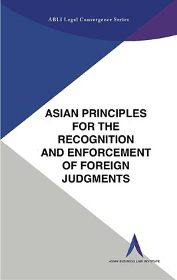
Since 2019, we have often highlighted the work of the Asian Business Law Institute. We have also been closely cooperating with Asian Business Law Institute in its project aiming to promote the harmonisation of the rules for the recognition and enforcement of foreign judgments in Asia (for detailed discussion, see our previous post "Great Attempt: An Asia-Wide Harmonized Regime for Recognition and Enforcement of Foreign Judgments").
Shortly, the Asian Business Law Institute will release an ambitious publication titled Asian Principles for the Recognition and Enforcement of Foreign Judgments.

The Asian Principles comprise 13 general principles for the recognition and enforcement of foreign judgments which are common among the ten ASEAN member states, Australia, China, India, Japan, and South Korea.
Many of the developments in this area of the law that we have discussed on China Justice Observer have been cited in the Asian Principles.
The Asian Principles will be released in eBook and hardcopy formats. Further details (including the table of contents) are available here.
Photo by Stephanie Yeh (https://unsplash.com/@cheez612) on Unsplash
Contributors: Guodong Du 杜国栋 , Meng Yu 余萌









